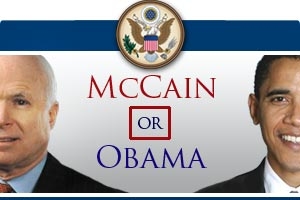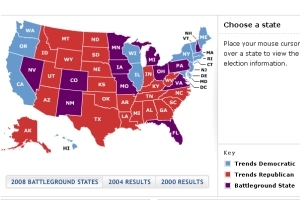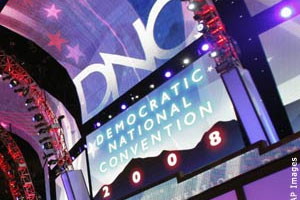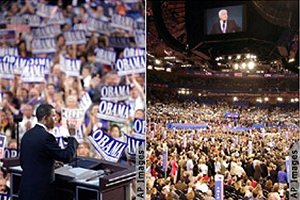America in context
Large Audiences Expected for Televised Presidential Debates

McCain, Obama will participate in three debates, beginning September 26. Polls show the presidential contest between John McCain and Barack Obama is extremely close, but upcoming debates could change that, political experts say.
Debates give Americans a chance to compare the candidates as they respond to tough questions and react to unscripted moments on live television.
Current poll numbers “can be wiped away in a second” during the debates, Stanley Greenberg, chief executive officer of the Democratic polling firm Greenberg Quinlan Rosner told journalists at the State Department’s Foreign Press Center September 16. Greenberg said he expects large audiences to tune in to the three presidential debates and one vice presidential debate.
“I don’t think the debates have ever been more important,” Neil Newhouse, co-founder of the Republican polling firm Public Opinion Strategies told journalists.
“I think there is a huge amount at stake in these debates and I think people will be watching very carefully and making decisions,” Newhouse said, adding that voters are asking themselves, “‘Do I feel safe, do I feel secure with Obama? Is he experienced enough?’ They are also asking themselves, ‘Do I feel … confident that the policies and programs of John McCain won’t be similar to George Bush’s?’
FORMAT OF DEBATES CAREFULLY PLANNED
Presidential debates are a mainstay of the American presidential campaign process. The first televised debate between major party nominees Richard Nixon and John Kennedy in 1960 was broadcast on television and radio. It illustrated the potential impact of debates and the importance of style and form as well as substance. Even though most of the radio audience believed Nixon had won the debate, the larger television audience thought Kennedy won, a response that likely contributed to Kennedy’s narrow victory.
Debates were not held again until 1976 and have been held every presidential election year since. Since its founding in 1987, the Commission on Presidential Debates (CPD), a nonpartisan organization, has planned the debates.
The first presidential debate, scheduled for September 26 at the University of Mississippi, will focus on foreign policy. The second will be a town-hall style debate at Belmont University in Nashville, Tennessee, October 7. The third debate will focus on the economy and domestic issues and will be October 15 at Hofstra University in New York.
Vice presidential candidates Joe Biden and Sarah Palin will debate October 2 at Washington University in St. Louis. There is no set topic for this debate.
The CPD began planning the 2008 debates in December 2006. Nearly every detail – including how the candidates will be positioned on the stage and who will be in the audience – is worked out in advance with the cooperation of the presidential campaigns.
Each debate will be televised live for 90 minutes and will be moderated by a different television news personality. The moderators are familiar people to most Americans: Jim Lehrer of PBS, Tom Brokaw of NBC and Bob Schieffer of CBS. Gwen Ifill of PBS will moderate the vice presidential debate.
For the first and third debates, the moderator writes his or her own questions. Each question fuels a nine-minute segment: two minutes each for candidates to answer the question; and five minutes for discussion, during which the moderator ensures each candidate gets about equal time. This differs from past debates, which used shorter segments and more questions.
The second debate, the town-hall-style event, will feature questions from an audience of undecided voters. In the days before the debate, the Gallup polling organization will poll voters who live in the Nashville area to find those who remain truly undecided. These voters will pose their own questions to the candidates. The moderator sees the questions in advance, but is not allowed to alter them.
For the first time, the town-hall moderator also will pose questions submitted by people via the Internet. The CPD has partnered with MySpace to create MyDebates, a Web site that allows people to submit questions and participate in political forums. MyDebates also will offer videos and transcripts from the debates. As an additional feature, the moderator can select questions about health care submitted by Americans to the health Web site, WebMD.
Only the major-party candidates will participate in the debates. The CPD has rules guiding eligibility for debates, including a 15 percent threshold – a candidate must garner about 15 percent support in five major national polls in the days leading up to the debates. This tends to limit debate participation to candidates of the major parties, although Ross Perot participated in 1992 and John Anderson in 1980.
Over the past two decades, another important aspect of the debates has developed – the “spin.” After each debate, campaign surrogates will speak to members of the press, making the case (or “spinning”) for why their candidate “won” the debate.
More information is available on the Commission on Presidential Debates Web site.
By Michelle Austein
Staff Writer
Recently on America in context
With Conventions Concluded, U.S. General Election Campaign Begins
 With the national political party conventions behind them, presidential candidates John McCain and Barack Obama are focusing their efforts on winning undecided voters in battleground states.
With the national political party conventions behind them, presidential candidates John McCain and Barack Obama are focusing their efforts on winning undecided voters in battleground states.
Barack Obama Selects Delaware Senator Joe Biden as Running Mate
 Long-serving leader brings years of foreign policy experience to ticket
Long-serving leader brings years of foreign policy experience to ticket
FAQ on Political Conventions
 The processes of the political national conventions have evolved over more than a century, but the purpose has remained the same -- to nominate presidential candidates and lay out goals and party priorities.
The processes of the political national conventions have evolved over more than a century, but the purpose has remained the same -- to nominate presidential candidates and lay out goals and party priorities.